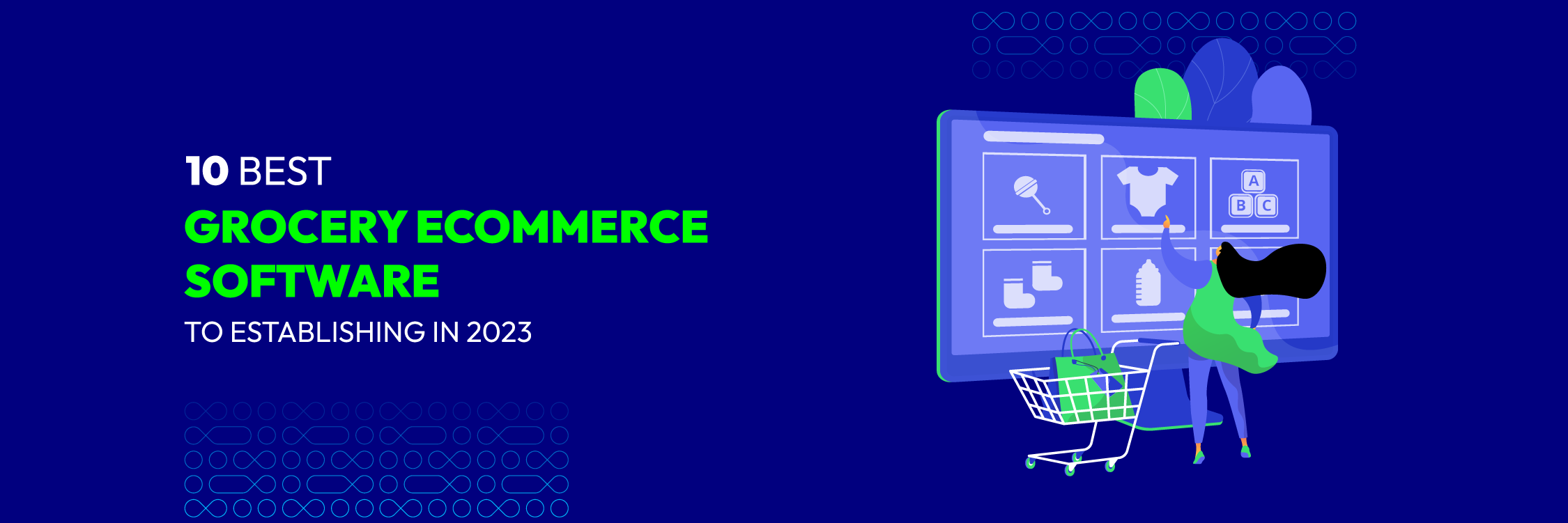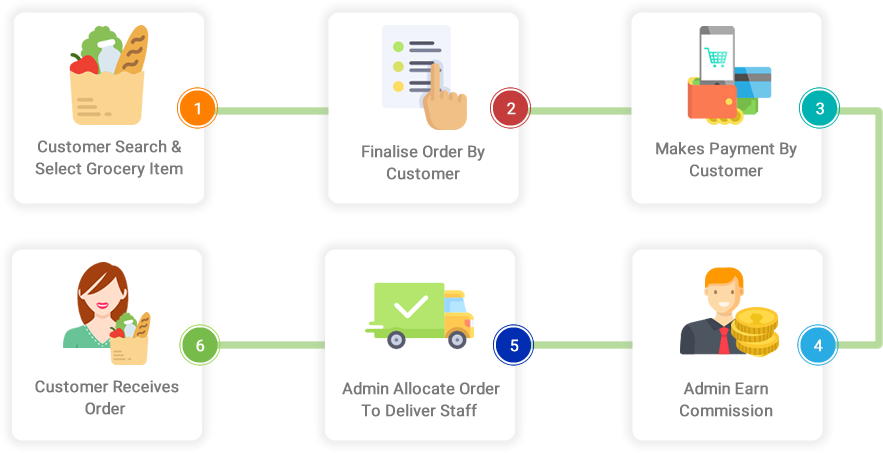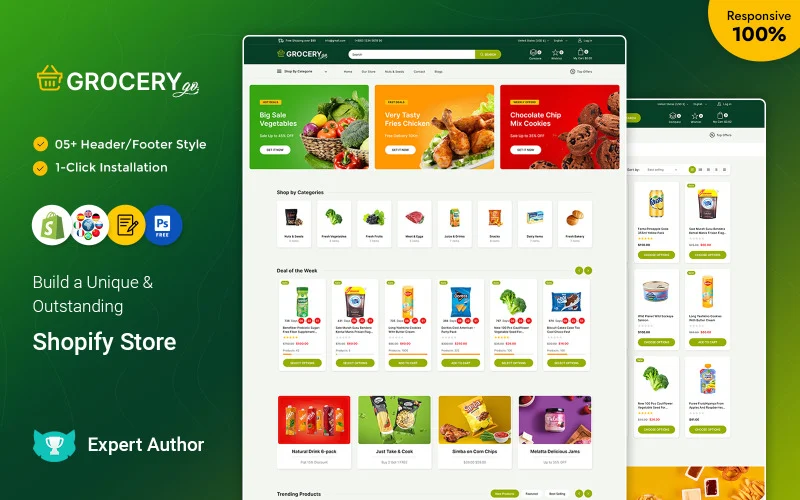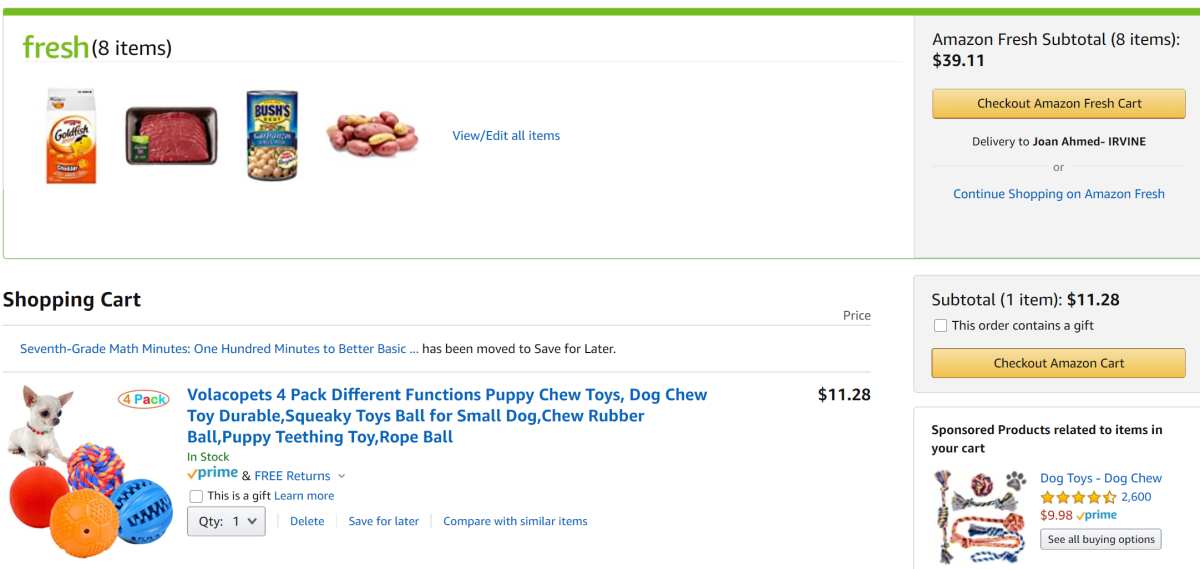10 Best Grocery eCommerce Software to Establishing in 2023
Summer Nguyen | 03-17-2025

The grocery eCommerce software has undergone a remarkable transformation in recent years, with an ever-increasing number of consumers turning to online platforms to fulfill their daily shopping needs. As we step into 2023, the online grocery market continues to surge in popularity, driven by convenience, accessibility, and evolving consumer preferences. For businesses looking to capitalize on this booming trend and establish their presence in the digital grocery landscape, choosing the right eCommerce software is of paramount importance. In this article, we explore the top 10 grocery eCommerce software solutions poised to empower businesses in creating successful online grocery marketplaces in 2023. Each platform comes with its unique strengths, features, and considerations, offering a diverse range of options to cater to specific business goals.
What is Grocery eCommerce Software? The advantages of grocery eCommerce software
Grocery eCommerce software refers to specialized technology solutions designed to facilitate the online sale and delivery of groceries. These software platforms are tailored to meet the unique needs of grocery businesses, aligning seamlessly with a well-structured grocery store business plan, allowing them to manage their inventory, offer a user-friendly online shopping experience, and efficiently fulfill customer orders for delivery or pickup. Here are the advantages of Grocery eCommerce Software for Business
- More potential customers: By establishing an online presence, grocery stores can reach a wider audience of potential customers who prefer the convenience of shopping for groceries online.
- Enables informed decision-making: Grocery eCommerce software often includes analytics and reporting tools that provide valuable insights into customer behavior, inventory management, and sales trends. This data can be used to make informed business decisions.

- Builds better customer relationships: These software platforms typically include features for managing customer accounts, tracking order histories, and providing personalized recommendations, fostering stronger relationships with customers.
- Reduces operating costs: Streamlining the ordering and delivery processes through automation can help reduce operational costs and improve efficiency, ultimately increasing profitability.
Best Grocery eCommerce Software to establishing online grocery marketplaces in 2023
1. Shopify
Shopify is a renowned and versatile eCommerce platform that is highly adaptable for various industries, including groceries. It offers a comprehensive set of features and tools to help businesses establish and manage online grocery marketplaces effectively in 2023.
Key Highlights
- User-Friendly Interface: Shopify is known for its user-friendly and intuitive dashboard. It simplifies the process of setting up and managing an online grocery marketplace, making it accessible to users with varying technical expertise.

- App Ecosystem: Shopify boasts a vast app ecosystem through the Shopify App Store. Grocery businesses can leverage these apps to enhance the platform’s functionality. This includes inventory management, order processing, delivery scheduling, and more, tailored to specific requirements.
- Scalability: Shopify is designed to scale alongside your business. Whether you’re a small local grocery store or a large supermarket chain, you can expand your online presence without technical limitations.
- SEO-Friendly: Shopify provides built-in SEO features and tools that enhance the visibility of your grocery marketplace in search engines. This facilitates the discovery of your products by potential customers.
Considerations
- Cost: Shopify operates on a subscription-based model, so businesses need to factor in the cost of monthly fees when budgeting for their online grocery marketplace. However, the pricing is transparent, and there are different plans to choose from based on your needs.
- App Costs: While there are many apps available in the Shopify App Store, some may come with additional costs. Businesses should carefully evaluate which apps they need to ensure they align with their budget.
- Learning Curve: While Shopify is user-friendly, there may still be a learning curve for users who are new to the platform or eCommerce in general. Consider investing time in training or seeking professional assistance if needed.
2. ShopurGrocery
ShopurGrocery is a specialized eCommerce software solution designed explicitly for online grocery businesses. It is tailored to meet the unique requirements and challenges faced by grocery stores entering the digital market in 2023.
Key Highlights
- Grocery Features: ShopurGrocery is built with grocery businesses in mind, providing a suite of features specific to the grocery industry. This includes tools for managing a wide range of products, categorizing items, handling perishables, and setting delivery time slots.
- Real-Time Inventory Management: ShopurGrocery offers real-time inventory tracking, ensuring that customers see accurate product availability. This helps prevent overselling and improves customer satisfaction.
- Delivery Scheduling: The platform includes features for customers to schedule delivery times that suit their preferences. This flexibility is crucial for online grocery shoppers.
- Secure Payment Processing: ShopurGrocery provides secure payment processing options, instilling confidence in customers when making online payments.
- Responsive Design: With mobile shopping on the rise, ShopurGrocery ensures that the online grocery marketplace is responsive and mobile-friendly, accommodating customers who prefer shopping on smartphones and tablets.
Considerations
- Scalability: While ShopurGrocery is well-suited for small to medium-sized grocery businesses, it’s important to evaluate whether it can scale to accommodate larger operations with extensive product catalogs and higher customer demands.
- Cost: Pricing for ShopurGrocery may vary depending on your specific requirements. Be sure to review the pricing structure and any associated fees to determine its affordability for your business.
- Integration: Consider whether ShopurGrocery integrates with other essential tools or software that your grocery business may already be using, such as accounting software or POS systems.
- Customization: While ShopurGrocery is tailored to groceries, it’s important to assess whether it offers enough customization options to align with your branding and unique business needs.
3. Growcer
Growcer is a comprehensive grocery eCommerce software solution that is specifically designed to meet the needs of online grocery businesses. It offers a wide range of features and tools to help businesses establish and manage successful online grocery marketplaces in 2023.
Key Highlights
- Complete Grocery Solution: Growcer provides a holistic approach to online grocery retail, offering features that cover every aspect of the business, from product management and customer engagement to order processing and delivery logistics.
- Responsive Website and Mobile App: Growcer typically includes both a responsive website and a mobile app, ensuring that customers can shop for groceries seamlessly from their preferred devices. This enhances the user experience and caters to mobile shoppers.
- Robust Search Functionality: The platform often incorporates advanced search and filtering options, allowing customers to easily find the specific grocery items they need. This is particularly important in the grocery industry, where product variety is extensive.
- Order Customization: Growcer often allows customers to customize their orders, specifying preferences for items like fruits and vegetables. This level of personalization enhances customer satisfaction.
- Delivery Route Optimization: For grocery delivery, the platform may include features to optimize delivery routes, reducing delivery times and operational costs.
- Customer Engagement: The platform may offer customer engagement tools, such as email marketing, promotions, and loyalty programs, to foster stronger relationships with your customer base.
Considerations
- Integration: Assess whether Growcer can integrate with other essential tools or software used in your grocery business, such as accounting software, POS systems, or third-party delivery services.
- Customization: While Growcer offers a comprehensive set of features, evaluate the platform’s customization options to ensure it can align with your branding and unique business requirements.
- Marketplace Size: Determine whether Growcer is suitable for your grocery marketplace’s size and specific needs, especially if you have niche or specialty products.
4. YoKart
YoKart is a multi-vendor eCommerce platform that can be customized to suit various industries, including online groceries. It is designed to enable businesses to create and manage multi-vendor marketplaces where multiple sellers can list and sell their products, making it suitable for building online grocery marketplaces in 2023.
Key Highlights
- Multi-Vendor Support: YoKart’s primary feature is its support for multi-vendor marketplaces. Grocery businesses can leverage this functionality to allow multiple grocery stores or vendors to list their products and services on a single platform.
- Catalog Management: The platform offers robust catalog management tools, allowing sellers to easily add, edit, and organize their grocery product listings. Customers can browse a wide variety of products from different vendors within one marketplace.
- Social Media Integration: YoKart may include social media integration features, enabling vendors to promote their products and allowing customers to share their shopping experiences on social platforms.
- Rating and Review System: A built-in rating and review system allows customers to provide feedback on products and sellers, enhancing transparency and trust within the marketplace.
- SEO-Friendly: The platform typically includes SEO optimization features to help improve the visibility of your online grocery marketplace in search engines.
Considerations
- Multi-Vendor Model: Since YoKart is primarily designed for multi-vendor marketplaces, evaluate whether this model aligns with your business strategy. It’s ideal for grocery businesses with multiple vendors or stores.
Read more: How to Launch a B2B Multi-Vendor Marketplace Successfully
-
Customization: While YoKart offers customization options, understand the extent to which you can customize the platform to meet your specific grocery business needs and branding requirements.
-
Vendor Management: Consider how you will manage and onboard multiple grocery vendors, including their product listings, quality control, and order fulfillment processes.
5. Mercatus
Mercatus is a specialized grocery eCommerce software platform designed to meet the unique needs of the grocery industry. It is tailored to help grocery businesses establish and manage online grocery marketplaces effectively in 2023.
Key Highlights
- Grocery-Focused Features: Mercatus offers a comprehensive set of grocery-specific features, including tools for product management, order processing, and delivery logistics. It is designed to address the unique challenges of online grocery retail.
- Digital Marketing: The platform typically includes robust digital marketing tools to help grocery businesses promote their products and engage with customers effectively. This may involve features for promotions, loyalty programs, and customer engagement campaigns.
Read more: 28+ Best Digital Marketing Tools in 2023
- Personalized Shopping Experiences: Mercatus often includes features for personalization, allowing customers to receive tailored recommendations based on their shopping history and preferences. This enhances the shopping experience and encourages repeat purchases.
- Data Insights: Mercatus may include analytics and reporting tools that provide valuable insights into customer behavior, purchase patterns, and product performance. This data can inform business decisions and marketing strategies.
Considerations
- Cost: Mercatus’ pricing structure may vary based on the features and customization required for your grocery business. Carefully review pricing plans to ensure they align with your budget.
- Customization: While Mercatus offers grocery-specific features, evaluate the platform’s customization options to ensure it can align with your branding and unique business requirements.
- Data Security: Given the sensitive nature of customer data in the grocery industry, ensure that Mercatus provides robust data security measures to protect customer information. “
6. Grobino
Grobino is a grocery eCommerce software platform designed to cater specifically to the needs of online grocery businesses. It offers a range of features and tools to help grocery stores establish and manage successful online grocery marketplaces in 2023.
Key Highlights
- Grocery-Centric Features: Grobino typically provides a comprehensive set of features tailored to the grocery industry. These features include tools for managing a wide range of grocery products, categorizing items, handling perishables, and scheduling delivery slots.
- Responsive Website: The platform often includes a responsive website, ensuring that customers can browse and shop for groceries easily on various devices, including smartphones and tablets.
- Delivery Scheduling: Grobino may provide features that allow customers to schedule their preferred delivery times, accommodating their convenience and ensuring timely delivery of groceries.
- Secure Payment Processing: The platform typically integrates with secure payment gateways, ensuring that customer transactions are safe and reliable.
- User-Friendly Interface: Grobino often offers an intuitive and user-friendly interface, making it accessible to grocery store owners and staff with varying technical expertise.
Considerations
- Cost: Grobino’s pricing structure may vary based on the features and customizations required for your grocery business. Carefully review pricing plans to ensure they align with your budget.
- Data Security: Given the sensitive nature of customer data in the grocery industry, ensure that Grobino provides robust data security measures to protect customer information.
- Localization: Depending on your target market, consider whether Grobino offers localization options to support multiple languages, currencies, and regional preferences.
7. Yelo
Yelo is an eCommerce platform designed to cater to a wide range of industries, including the grocery sector. It offers features and tools to help businesses create and manage their online grocery marketplaces effectively in 2023.
Key Highlights
- Multi-Industry Flexibility: Yelo is known for its adaptability to various industries, making it suitable for online grocery businesses. It provides a versatile foundation to build and customize your grocery marketplace.
- Customizable Storefront: Yelo typically offers a customizable storefront, allowing you to tailor the look and feel of your online grocery marketplace to align with your brand identity and unique business requirements.
- Delivery and Pickup Options: The platform typically provides flexibility in offering various delivery and pickup options, allowing customers to choose the most convenient method for receiving their groceries.
- Secure Payment Processing: Yelo typically integrates with secure payment gateways, ensuring that customer transactions are processed safely and reliably.
- User-Friendly Interface: Yelo offers an intuitive and user-friendly interface, making it accessible to grocery store owners and staff with varying levels of technical expertise.
Read more: What is User Interface (UI)? The difference between UX and UI
Considerations
- Localization: Depending on your target market, consider whether Yelo offers localization options to support multiple languages, currencies, and regional preferences.
- Specific Grocery Features: While Yelo is adaptable to various industries, evaluate whether it provides specific grocery-related features and functionalities that are essential for your online grocery marketplace.
8. My Cloud Grocer
My Cloud Grocer is a grocery eCommerce software platform tailored specifically to the grocery industry. It is designed to assist grocery businesses in creating and managing their online grocery marketplaces efficiently in 2023.
Key Highlights
- Grocery-Focused Features: My Cloud Grocer offers a comprehensive set of grocery-centric features. These features are designed to address the unique challenges and requirements of online grocery retail, including handling perishables and managing a diverse product catalog.
- Responsive Website and Mobile App: The platform typically includes a responsive website and may offer a mobile app, ensuring that customers can easily shop for groceries from their preferred devices, including smartphones and tablets.
- Real-Time Inventory Management: My Cloud Grocer provides real-time inventory tracking and management capabilities. This helps grocery businesses maintain accurate stock levels, reduce overselling, and optimize supply chain management.
- User-Friendly Interface: My Cloud Grocer offers an intuitive and user-friendly interface, making it accessible to grocery store owners and staff with varying levels of technical expertise.
Considerations
- Cost: My Cloud Grocer’s pricing structure may vary depending on the features and customizations required for your grocery business. Review pricing plans to ensure they align with your budget.
- Integration: Assess whether My Cloud Grocer can integrate with other essential tools or software used in your grocery business, such as accounting software, POS systems, or third-party delivery services.
- Localization: Depending on your target market, consider whether My Cloud Grocer offers localization options to support multiple languages, currencies, and regional preferences.
9. ShopHero
ShopHero is an eCommerce platform specifically designed for the grocery industry. It aims to assist grocery businesses in creating and managing their online grocery marketplaces effectively in 2023.
Key Highlights
- Secure Payment Processing: ShopHero typically integrates with secure payment gateways, ensuring the safety and reliability of customer transactions.
- User-Friendly Interface: ShopHero is known for its user-friendly and intuitive interface, making it accessible to grocery store owners and staff with varying levels of technical expertise.
- Order Management: The platform includes features for efficient order management, enabling businesses to process orders, manage deliveries, and communicate with customers seamlessly.
- Customization: While ShopHero is designed for groceries, it often offers customization options. This allows businesses to align the online grocery marketplace with their brand identity and unique business requirements.
- Customer Support: Access to reliable customer support is essential for addressing any technical issues or inquiries that may arise while operating your online grocery marketplace. Evaluate the level and availability of support provided by ShopHero.
Considerations
- Integration: Assess whether ShopHero can integrate with other essential tools or software used in your grocery business, such as accounting software, POS systems, or third-party delivery services.
- Data Security: Given the sensitive nature of customer data in the grocery industry, ensure that ShopHero provides robust data security measures to protect customer information.
Read more: Website Backups: Ensuring Data Security and Reliability
- Localization: Depending on your target market, consider whether ShopHero offers localization options to support multiple languages, currencies, and regional preferences.
10. Amazon Fresh
Amazon Fresh is a grocery eCommerce platform offered by Amazon, one of the world’s largest and most well-known online retailers. It is designed to enable businesses to establish and manage their online grocery marketplaces effectively in 2023. Amazon Fresh primarily focuses on delivering a wide range of groceries and fresh produce to customers’ doorsteps.

Key Highlights
- Extensive Product Selection: Amazon Fresh boasts an extensive selection of grocery items, including fresh produce, pantry staples, household goods, and more. It allows businesses to offer a broad range of products to their customers.
- Fast and Reliable Delivery: Amazon Fresh offers fast and reliable grocery delivery services, often with same-day or next-day delivery options. This quick turnaround time enhances customer satisfaction and convenience.
- Integration with Amazon Ecosystem: Businesses that choose Amazon Fresh can benefit from integration with the larger Amazon ecosystem, including access to Amazon Prime members who often receive special discounts and perks.
- Customer Trust: Amazon’s reputation for reliability, customer service, and secure payment processing can help instill trust in customers, potentially leading to increased sales and customer loyalty.
- Analytics and Insights: Amazon Fresh often provides analytics and insights into customer behavior, allowing businesses to make data-driven decisions and tailor their offerings to customer preferences.
Considerations
- Competition: Amazon Fresh is a part of the larger Amazon marketplace, which can be highly competitive. Consider how you’ll differentiate your offerings and compete effectively.
- Brand Identity: While you can customize some aspects of your storefront, Amazon Fresh may not provide the same level of brand identity control as having your standalone eCommerce website.
- Dependence on Amazon: Businesses using Amazon Fresh are dependent on Amazon’s policies and infrastructure, which may change over time. It’s essential to stay informed about any updates or changes that could affect your business.
- Customer Data Access: Depending on the agreement with Amazon, businesses may have limited access to customer data compared to having their eCommerce platform. This can impact your ability to build direct relationships with customers.
Conclusion
From industry giants like Amazon Fresh to specialized platforms like Mercatus, businesses have a wide array of options to cater to their specific needs. The key to success lies in a thorough assessment of these software platforms against your business goals and requirements. Whether you prioritize an extensive product selection, efficient delivery logistics, or a personalized shopping experience, there’s a solution that can align with your vision. However, be mindful of factors like pricing structures, integration capabilities, customization options, data security, and the ever-essential customer support when making your choice. As technology continues to evolve and consumer preferences evolve with it, staying adaptable and responsive to emerging trends is crucial. Whichever grocery eCommerce software you choose, remember that success also hinges on your ability to innovate, deliver exceptional service, and build lasting relationships with your customers in this dynamic and competitive marketplace.








